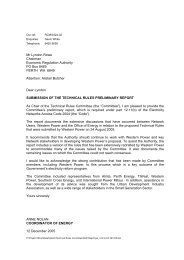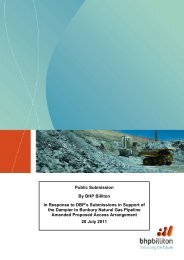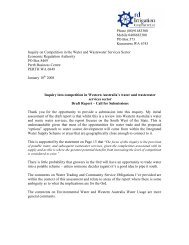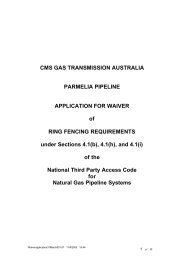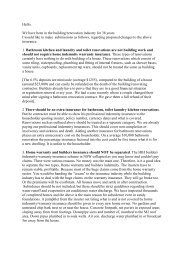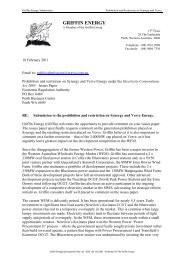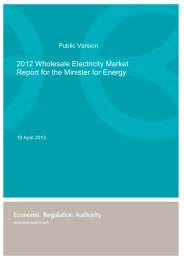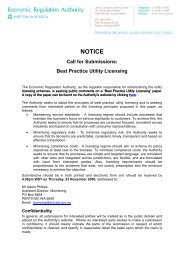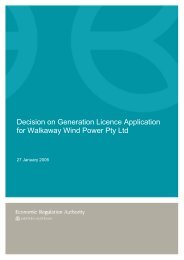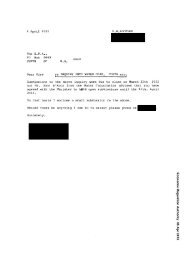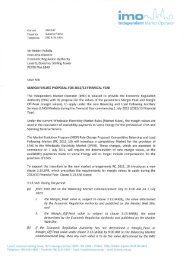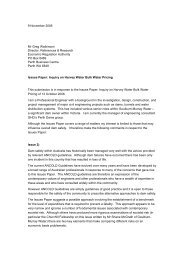Western Power Network Pricing - ERA Economic Regulation ...
Western Power Network Pricing - ERA Economic Regulation ...
Western Power Network Pricing - ERA Economic Regulation ...
You also want an ePaper? Increase the reach of your titles
YUMPU automatically turns print PDFs into web optimized ePapers that Google loves.
Deferred revenue<br />
The Draft Decision proposes to permit <strong>Western</strong> <strong>Power</strong> to recover the revenue deferred in<br />
connection with capital contributions at the start of the AA2 period over a ten year period starting<br />
with the AA3 period. 18 The deferral in revenue arose out of a change in the treatment of<br />
contributed assets from the end of AA1 to the start of AA2.<br />
The Draft Decision notes that clause 6.4(c) of the ENAC provides that pricing arrangements should<br />
seek to avoid imposing price shocks.<br />
The Council considers that this deferred revenue should be recouped over the life of the underlying<br />
assets. Ordinarily, returns on capital occur over the useful life of that capital asset 19 . The Authority<br />
takes this approach in relation to the network assets constructed by <strong>Western</strong> <strong>Power</strong>. The<br />
Authority’s approach makes sense for <strong>Western</strong> <strong>Power</strong>’s assets as these assets provide services<br />
continuously over their useful life, and collecting the capital return in the year of construction would<br />
not be feasible. The approach, in other words, is to match the period for repayment of capital to the<br />
useful life of the asset.<br />
The Council considers that there is no good reason to depart from the ordinary practice of<br />
recovering the return on the assets over their useful life (understood to be around 40 years). The<br />
fact these are contributed assets should not change the approach.<br />
The submission from the Office of Energy argued for a short recovery period on the basis that a<br />
longer period might impose possible cash flow problems on <strong>Western</strong> <strong>Power</strong>. However, <strong>Western</strong><br />
<strong>Power</strong> has not provided any evidence to demonstrate it expects to suffer a cash flow problem in<br />
practice that would justify a shorter recovery period than the usual period for recovery of capital. In<br />
this regard, the Council agrees with the Draft Decision’s overall observation that the “price control<br />
provides adequate revenue to meet the forward-looking and efficient costs of providing covered<br />
services”. 20<br />
The Council also considers that:<br />
<br />
<br />
Despite the arguments by <strong>Western</strong> <strong>Power</strong> to the contrary, an early repayment period of<br />
10 years imposes a potential intergenerational debt on current users given the assets being<br />
repaid in the 10 year period will continue to provide services well past 10 years.<br />
There is no strong basis for selecting a 10 year recovery period rather than the useful life of<br />
the relevant assets.<br />
18 The Draft Decision proposes to re-examine the length of the period at the start of AA4 period.<br />
19 The Australian Accounting Standards Board Accounting Standard AASB 116, Property, Plant and Equipment<br />
states that “The depreciable amount of an asset shall be allocated on a systematic basis over its useful life” p 23,<br />
http://www.aasb.gov.au/admin/file/content105/c9/AASB116_07-04_COMPjun09_07-09.pdf<br />
20 <strong>ERA</strong> Draft Decision, p. 241, paragraph 1018.<br />
17




